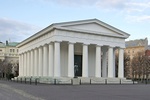Who's The God of Writing?
5 posters
Page 1 of 1
 Who's The God of Writing?
Who's The God of Writing?
I have known some people to claim Hermes to be the God of Writing and Writers because He's the God of Communications and Heralds. But is there a God Who is specifically noted to literary creation?

AgathonZante- God Member

- Posts : 289
Join date : 2014-02-17
Age : 39
 Re: Who's The God of Writing?
Re: Who's The God of Writing?
This is something I've been wondering about as well. Kalliope is one of the Muses and one of her domains is epic poetry, she's often depicted holding some sort of scroll in earlier art. I'd like to know who's specifically the god/dess of writing though, perhaps Apollon?
Momos- Newbie

- Posts : 15
Join date : 2014-03-30
Location : Sweden
 Re: Who's The God of Writing?
Re: Who's The God of Writing?
Hermes is given the credit for having invented the alphabet and teaching man how to write. So I'd consider him foremost as the god of writing

Linda- Full Member

- Posts : 101
Join date : 2013-04-17
Location : Stockholm, Sweden
 Re: Who's The God of Writing?
Re: Who's The God of Writing?
In short, it depends very much on what you mean by 'writing'.
To you and me in contemporary Western culture, when we think of 'writing' we usually think of it as synonymous with 'composition' — if I say 'I want to be a writer', to us, that means 'I want to be an author/poet etc.' This is actually quite different from how the Greeks and Romans thought of 'writing'.
To the Greeks and Romans, writing and composition were totally different things. 'Writing' meant, what we would call 'record keeping'. If you were an author or a poet, you were actually considered a 'singer'. Compositions were considered to be inspired by the soul and by the Muses, and to be directly revealed to the heart and mind of the author or poet. It was only written down in order to preserve it. The story was not considered to be tied to its written form — which is quite different from how we think of things today in our highly textual culture. The Greeks and Romans, actually, even read differently than we do. As most scholars believe, when a person in Classical Greece or Rome sat down to read a book, it was not a quite, contemplative thing the way it is for us. Instead, it was more like a 'story time', even if the person was only reading for him/herself. To our knowledge, in the Classical world, all reading was done aloud. It was seen like we see written music, as something that had to be 'played'. This is also why virtually all early Classical literature is composed as poetry, regardless of what the subject matter was – because it was all meant to be recited, not 'read'.
The deities of composition and inspiration, regardless of form (theatre, poetry, artwork, speech, etc.) are the nine Muses, Phoebus-Apollo, their leader and guide, and Memory, the Muses' mother, and a consort of Jove.
The idea of the actual mechanical act and form of writing/written words/grammar itself as being something sacred and powerful does become commonplace in mid and late Antiquity – however, the cultural origin of 'sacred writing/words' is most likely Egyptian. After the Hellenistic absorption of Egypt into the Graeco-Roman cultural sphere, the Graeco-Roman Ἕρμης/Mercurius was customarily identified with the Egyptian ibis-bird faced deity Thoth, who, like Ἕρμης/Mercurius, had dominion over documentation and communications between God and mortals, and was considered the inventor of writing. However, whereas this communication was, in Greece and Rome, associated traditionally with speaking and hearing, in Egypt, long the abode of the written word, writing was itself considered very sacred, and so, by extension, the dominion of writing and words comes to be ascribed customarily to Ἕρμης/Mercurius, as a result of a widespread Egyptian influence.
That's precisely the difference I'm discussing – i.e. the Graeco-Roman distinction between literal writing (the domain of Ἕρμης/Mercurius), and literary creation (the domain of Phoebus and the Muses).
There is, however, also an account, at least in Orphic religion, that Phoebus received the famous lyre with which he is associated, and which is the symbol of Apollinine inspiration, from Ἕρμης/Mercurius, at the behest of Jove.
I hope that clears up some of the ambiguity.
To you and me in contemporary Western culture, when we think of 'writing' we usually think of it as synonymous with 'composition' — if I say 'I want to be a writer', to us, that means 'I want to be an author/poet etc.' This is actually quite different from how the Greeks and Romans thought of 'writing'.
To the Greeks and Romans, writing and composition were totally different things. 'Writing' meant, what we would call 'record keeping'. If you were an author or a poet, you were actually considered a 'singer'. Compositions were considered to be inspired by the soul and by the Muses, and to be directly revealed to the heart and mind of the author or poet. It was only written down in order to preserve it. The story was not considered to be tied to its written form — which is quite different from how we think of things today in our highly textual culture. The Greeks and Romans, actually, even read differently than we do. As most scholars believe, when a person in Classical Greece or Rome sat down to read a book, it was not a quite, contemplative thing the way it is for us. Instead, it was more like a 'story time', even if the person was only reading for him/herself. To our knowledge, in the Classical world, all reading was done aloud. It was seen like we see written music, as something that had to be 'played'. This is also why virtually all early Classical literature is composed as poetry, regardless of what the subject matter was – because it was all meant to be recited, not 'read'.
The deities of composition and inspiration, regardless of form (theatre, poetry, artwork, speech, etc.) are the nine Muses, Phoebus-Apollo, their leader and guide, and Memory, the Muses' mother, and a consort of Jove.
The idea of the actual mechanical act and form of writing/written words/grammar itself as being something sacred and powerful does become commonplace in mid and late Antiquity – however, the cultural origin of 'sacred writing/words' is most likely Egyptian. After the Hellenistic absorption of Egypt into the Graeco-Roman cultural sphere, the Graeco-Roman Ἕρμης/Mercurius was customarily identified with the Egyptian ibis-bird faced deity Thoth, who, like Ἕρμης/Mercurius, had dominion over documentation and communications between God and mortals, and was considered the inventor of writing. However, whereas this communication was, in Greece and Rome, associated traditionally with speaking and hearing, in Egypt, long the abode of the written word, writing was itself considered very sacred, and so, by extension, the dominion of writing and words comes to be ascribed customarily to Ἕρμης/Mercurius, as a result of a widespread Egyptian influence.
But is there a God Who is specifically noted to literary creation?
That's precisely the difference I'm discussing – i.e. the Graeco-Roman distinction between literal writing (the domain of Ἕρμης/Mercurius), and literary creation (the domain of Phoebus and the Muses).
There is, however, also an account, at least in Orphic religion, that Phoebus received the famous lyre with which he is associated, and which is the symbol of Apollinine inspiration, from Ἕρμης/Mercurius, at the behest of Jove.
I hope that clears up some of the ambiguity.
 Re: Who's The God of Writing?
Re: Who's The God of Writing?
It's interesting to compare the Greek reactions to Thoth and to the Babylonian Nabu. When the names of the planets were translated into Greek, "star of Nabu" became "star of Hermes" — hence our Mercury. But later Greek settlers in Mesopotamia identified Nabu with Apollo. Greece was a very oral culture, compared with Egypt and Mesopotamia: based on the political orator rather than the professional administrator.
DavidMcCann- Sinior Member

- Posts : 130
Join date : 2014-04-20
Location : London
Page 1 of 1
Permissions in this forum:
You cannot reply to topics in this forum